The 9 Unhealthiest Deli Counter Foods on the Planet

Ready-to-go deli counter foods are great meal options, especially when you're short on time. Whether you need a quick dinner for your family, food for a party, a work pot-luck or you just don't feel like cooking, the deli counter is a one-stop shop for everything. From perfectly layered sandwiches filled with your favorite meat, cheese and toppings to sides and main entrees, you can have a complete meal with little effort.
It's super convenient, but do you really know what you're eating? Deli counter food is delicious, but it could wreak havoc on your health if some items are consumed too often. Many foods are loaded with salt and saturated fat, which can lead to major health problems.
According to the American Heart Association, if you're following a 2,000-calorie-a-day diet, you should not have more than 13 grams of saturated fat. Too much can lead to serious health issues like high cholesterol and heart disease.
In terms of sodium many deli counter foods are packed with salt for flavor. It's tasty, but you're putting your health at risk. The American Heart Association says too many Americans consume more salt than recommended. The organization suggests having no more than 2,300 milligrams a day, but many people have 3,500mg daily.
To help guide you through the plethora of choices at the deli counter, here are the unhealthiest foods you can order ranked from bad to worst.
White Kaiser Roll

Fat: 1.5-3g (Saturated fat: -g)
Sodium: -mg
Carbs: 32-60g (Fiber: 1-2g , Sugar: 1-2g)
Protein: 6-11g
A white Kaiser roll is a classic bread for many deli sandwiches, but it's mostly empty carbs. While it's the least processed food on our list, there's no nutritional value and if eaten too much a white Kaiser roll can be bad for your blood sugar.
"Depending on its size, one roll can contain 200 to 400 calories, largely from refined carbohydrates," says Mary Sabat, MS, RDN, LD. "These carbs break down quickly in the body, causing spikes in blood sugar that may lead to energy crashes, increased hunger, and weight gain if consumed regularly."
She adds, "With just 1–2 grams of fiber and very little nutritional value compared to whole-grain options, it lacks the satiety and benefits of more complex carbs. Though not harmful in moderation, relying on white Kaiser rolls as a staple can negatively impact blood sugar control and long-term health."
Fried Chicken Cutlets
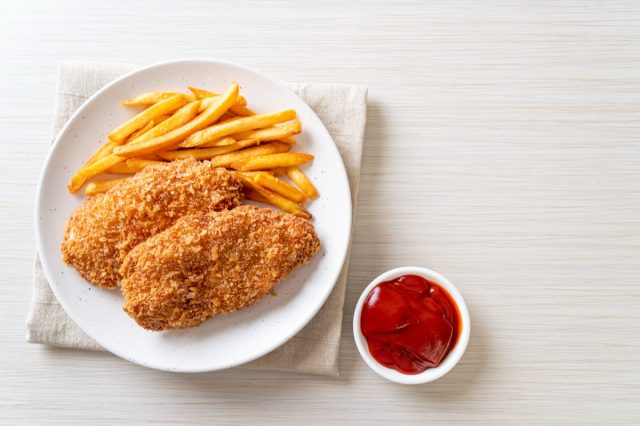
Fat: 8.4g (Saturated fat: 1.9g)
Sodium: 729mg
Carbs: 16g (Fiber: 1g , Sugar: 1g)
Protein: 31g
Fried chicken cutlets are a common deli item that can turn into countless dinners. From chicken parmigiana to sandwiches to serving with mac and cheese or mashed potatoes and veggies, the meal ideas are wide-ranging, but it's not a healthy win by any means.
"Fried chicken cutlets may seem like a protein-packed option, but they're far from a healthy deli choice," says Sabat. "Typically breaded with refined flour and deep-fried in seed oils, these cutlets are high in unhealthy fats that can promote inflammation and contribute to heart disease."
Sabat explains, "While one serving does offer 31 grams of protein, it's paired with 8.4 grams of fat and 16 grams of simple carbohydrates, making it a calorie-dense food with poor nutrient quality."
And don't let the low level of fats fool you/
According to Sabat, "Even small amounts of trans fat—like the 0.1g found here—can negatively impact cholesterol levels. The combination of processed breading, frying methods, and inflammatory oils makes this a deli item best enjoyed rarely."
Meatball Sub
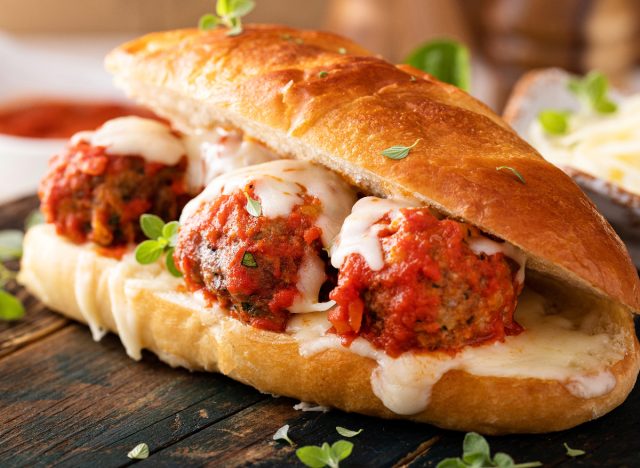
Fat: 18g (Saturated fat: 6.8g)
Sodium: 808mg
Carbs: 41g (Fiber: 2.7g , Sugar: 5.9g)
Protein: 27g
A good meatball sub is the perfect combination of quality savory meatballs and tomato sauce that's smothered in melted cheese. It's a classic comfort food, but it's a calorie bomb served with refined bread that's not healthy.
"While it provides a solid 27 grams of protein, it's loaded with calories, saturated fat, and sodium," says Sabat. "Most of the calories—437 in just one sandwich—come from fatty, processed meatballs and refined bread."
She explains, "With 6.8 grams of saturated fat and over 800 mg of sodium, it contributes to inflammation and raises the risk for heart disease and high blood pressure. The highly processed nature of the meat, sauce, and white sub roll also adds to concerns, making the meatball sub more of a splurge meal than a smart deli pick."
Pastrami

Fat: 5-6g (Saturated fat: 2-2.5g)
Sodium: 920-1,000mg
Carbs: 0.5g (Fiber: 0g , Sugar: 0.2g)
Protein: 18g
Pastrami is a popular deli meat, but think twice before doubling up on the meat for a sandwich. It's full of salt.
According to Sabat, "Pastrami is a processed deli meat that, while slightly leaner than salami, still carries significant health concerns. A 3 oz portion offers around 18 grams of protein, but it also delivers close to 1,000 mg of sodium—nearly half of the recommended daily limit."
She explains, "It's typically cured with nitrates and nitrites and often contains added preservatives. While the fat content is moderate, the sodium and processing make pastrami a risky choice for regular consumption, especially for those with high blood pressure or heart concerns. Like other cured meats, it's best enjoyed sparingly."
Deli Ham
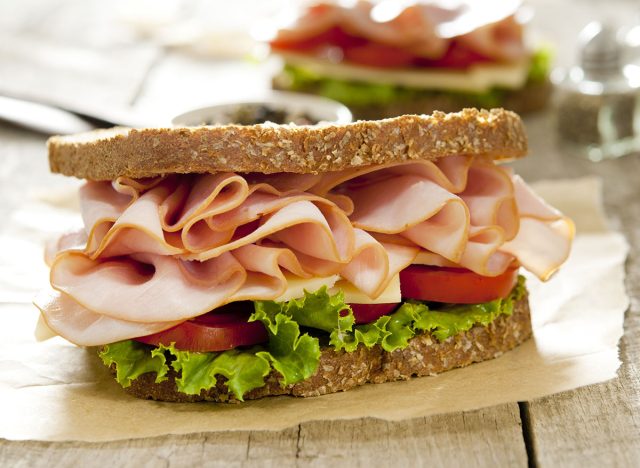
Fat: 4g (Saturated fat: 0g)
Sodium: 1,050mg
Carbs:1g (Fiber: 0g , Sugar: 0g)
Protein: 14g
While ham is a traditional holiday dish for many, it's also a well liked meat for sandwiches that all delis offer. But Sabat warns about the dangers of eating too much of it.
"Deli ham might seem like a lean and convenient protein option, but it's one of the saltiest meats you'll find in the deli case."
She says, "A 3-ounce serving contains over 1,000 mg of sodium—nearly half the recommended daily limit in just one portion. While it offers 14 grams of protein and is relatively low in fat and calories, its high sodium content can contribute to elevated blood pressure and water retention."
Sabat goes on to explain that "like other processed meats, deli ham is cured with nitrates and nitrites, which have been linked to an increased risk of certain cancers. Despite its low-carb appeal, deli ham is best eaten in moderation and ideally replaced with less processed alternatives."
Corned Beef
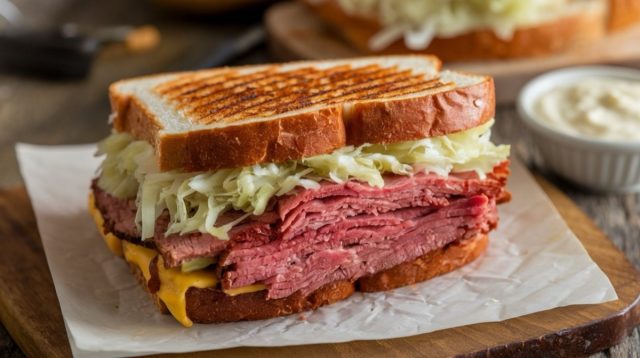
Calories: 213
Fat: 16.2g (Saturated fat: 0 g)
Sodium: 827mg
Carbs: 0.4g (Fiber: 0g , Sugar: 0g)
Protein: 15.5g
Corned beef is a tender and flavorful meat that does have some health benefits, but the amount of salt and fat content lessens the nutritional value.
"Corned beef, while rich in protein, iron, and vitamin B12, is another deli meat that should be eaten sparingly due to its high fat and sodium content," Sabat says.
"A 3 oz serving delivers over 800 mg of sodium—more than a third of the recommended daily intake—making it a concern for heart health and blood pressure. It's also high in saturated fat, and like other processed meats, it contains preservatives that have been linked to increased cancer risk."
She adds, "Though it may seem hearty and flavorful, the long-term health implications of regularly eating corned beef outweigh the nutritional benefits."
Chicken Salad
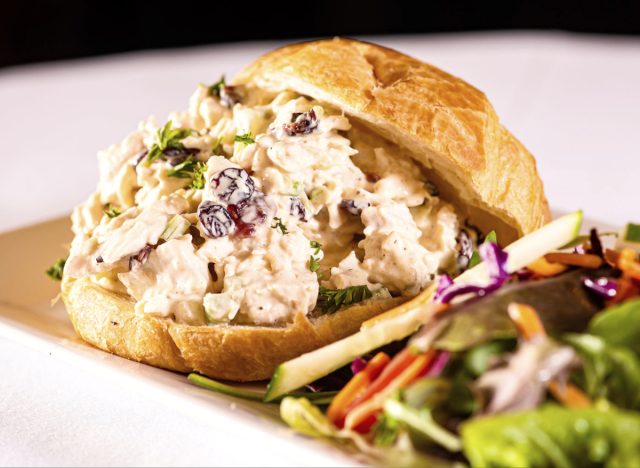
Fat: 35 g (Saturated fat: 6g)
Sodium: 230mg
Carbs: 3g (Fiber: 1g , Sugar: 1g)
Protein: 16g
Chicken salad at the deli counter is deceiving. It seems like an obvious healthy choice, but according to Sabat, it's actually the opposite because of how it's prepared.
"A typical 1-cup portion contains a hefty 400 calories, with the majority coming from fat—especially from inflammatory seed oils used in low-quality mayonnaise, she points out.
Sabat explains, "While it offers a moderate 16 grams of protein, the 35 grams of fat (including 6 grams of saturated fat) make it a poor macronutrient balance for most people trying to eat clean or lose weight."
She adds, "With minimal fiber and carbs, plus very little nutritional density from vegetables or whole ingredients, deli chicken salad often delivers more processed fat than real nourishment, making it a calorie-dense but nutrient-poor meal."
Processed Cheese Slices

Fat: 9g (Saturated fat: 6g)
Sodium: 350mg
Carbs: 1g (Fiber:0 g , Sugar: 0g)
Protein: 6g
Adding sliced cheese to anything is an easy way to enhance flavor, but it's really processed, high in fat for a tiny amount.
According to Sabat, "A single 1 oz slice of American cheese delivers 110 calories, most of which come from fat—particularly the 6 grams of saturated fat, which makes up 30% of the recommended daily value."
She says, "These cheeses are highly processed, often made with emulsifiers, artificial coloring, and preservatives, and they offer only modest protein for the calories. With 350 mg of sodium per slice, they can quickly add up to excessive salt intake when stacked in sandwiches or melted on multiple dishes. Their artificial nature and poor nutrient density make processed cheese one of the least healthy choices in the deli."
Salami

Fat: 15-30g (Saturated fat: 6-10g)
Sodium: 600-1,200mg
Carbs:0-1.5 g (Fiber: 0g , Sugar: 0g)
Protein: 9-15g
The No. 1 unhealthiest deli counter food is salami! It doesn't have much protein and it's high in all the things that pose health challenges like fat and salt.
"A 3 oz serving can contain up to 300 calories and nearly 30 grams of fat, most of which is saturated," says Sabat. " Its sodium content is also excessive, delivering over 1,000 mg in one portion—about half the daily limit for most people. The inclusion of nitrates and nitrites in cured meats like salami adds to the health concerns, with links to inflammation and increased cancer risk."
Sabat advises, "Despite its bold flavor, salami is a highly processed indulgence that should be eaten rarely, if at all."









